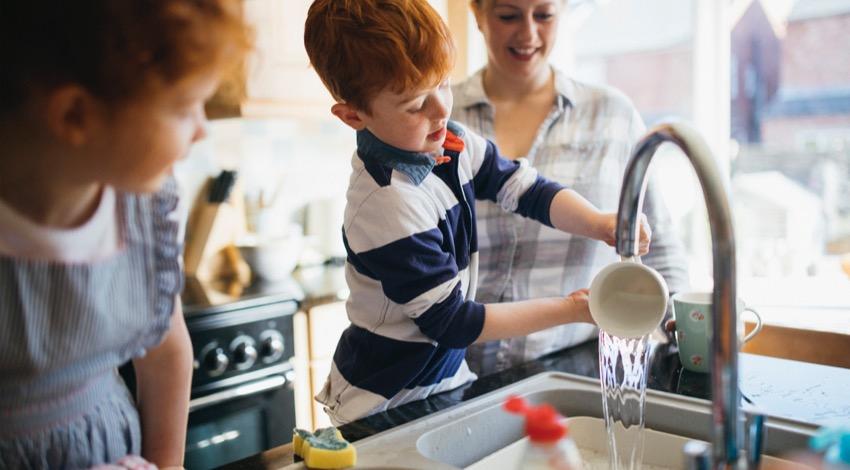Kids and Chores: Chilling The Chore Wars

How to get help on the home front? Try these tips to chill the chore wars. Bring children onboard to help in your organized home!
When it comes to kids and housework, the blasted terrain is familiar: a dirty house, balky children, and frazzled, frustrated parents--and a new school year throws the issue into high relief.
Tired parents try it all, from chore charts to screaming fits. Canny children engage in housework sabotage, selective hearing or childish irresponsibility to duck assignments. The noise levels--and stress levels--rise along with the stacks of dishes.
How to negotiate a peace on the issue of children and chores? Try these family-tested strategies to calm the conflict and gain the goal.
The Buck(et) Stops Here
We have met the enemy, and it is us! Lingering ambivalence about our family's life and our own choices can keep us from successfully gaining kid cooperation where household chores are concerned.
Perhaps we grew up in a home heavy with sex-role stereotypes but have chosen a different viewpoint. Maybe we work, and feel a lingering guilt. Some of us may still harbor childish resentment against our own parents, and feel uneasy about "making" children do household chores.
Whatever the reason, an ambivalent mindset can sabotage attempts to enlist children in the fight. Too often, we announce a new regime of household chores in a moment of anger and frustration. Elaborate chore charts are made and ignored after the third day. Family meetings are held which settle nothing more than another layer of dust on the television.
This time, resolve to succeed. The place to start is with our own thinking. Housework is an inevitable part of life.
Just as we prepare our children for their adult lives by sending them to school, so we need to prepare them to manage and maintain a home. Housework is an integral part of life for everyone, man, woman, and child. In today's busy families, there's no excuse for anybody to shirk their portion of the necessary work.
A parent who knows this truth in his or her bones has a huge advantage. No more peaks-and-valleys cycles of "You will help with the chores!" followed by a relapse into "Ehhh, why bother? It's easier to do it myself!"
Calm, determined parents who view household work as just another life skill are inoculated against childish manipulation and evasion. Motivated by parental love and responsibility, you'll go farther than fits-and-starts efforts fired by anger and frustration.
Start Small
The easiest way to secure your children's assistance with housework is to train them to it from the time they are small. A one-year-old will giggle if handed a clean diaper to dust the legs of the furniture.
Preschoolers enjoy being with parents, working with parents. Nothing can be so much fun as washing a car with a five-year-old! (A pause for a tear-in-eye here, remembering my five-year-old younger son staggering from the garage with the car-wash bucket and supplies, and announcing, proudly, "Mommy, we're the Clean-Up Chappies!")
Problem is, these little ones' efforts don't yet have the power to be of great help. In truth, you'll probably have to follow behind that one-year-old with his diaper duster, removing the specks of dirt he's rearranged. Even when you match the chore to the child, the early years require some extra work from you.
Listen up, parents of tiny children: just do it! You have two tasks during these years.
The short-term goal is to get the house clean; the more important duty is to teach your children to work. Focus on the first task to the exclusion of the second, and you're going to have "They think I'm the maid!" days, weeks, years in your future.
An investment in your child's learning now will reap abundant fruit in just a few years. Neglect this job, and you're walking into a lion's den once little ones are little no longer.
Make Like A Glacier
So your children are at an age to be of help, but their idea of "helping" is lifting their feet from the floor so you can vacuum beneath them? The temptation is to declare, "New Program!" and institute sweeping, dramatic changes in the life of the house. Most of the time, the new rules only last as long as you are prepared to enforce them. In normal experience: less than a week. Life returns to dull normal, and you're back in the soup.
Instead, remember the glacier. Each year, just a bit more snow falls upon a growing glacier, but over time, the result is powerful enough to grind boulders into pebbles and scour mountain passes to bedrock.
Make changes gradually, involving children in chores slowly. This month, decide that one child will assist with pre-dinner preparation, the other help with clean-up. Next month, begin a Saturday morning family clean-a-thon. By the end of the year, teach the eldest child to do his or her own laundry, and put the younger child in charge of collecting newspapers, bottles and cans for recycling. By the following summer, teach them to help you weed and prune in the yard.
Gradual change has many advantages over the "You will help!" confrontational method. It gives you time to teach a child your household's standard for each cleaning chore. It involves children in housework more naturally, and in tandem with a helping parent. It doesn't require a noisy, angry family shake-up-and stands less chance of triggering a child's natural "I don't wanna!" response.
Gradual change also acknowledges certain human limitations. It takes 21 days to make a habit. It's extremely difficult to form more than one habit at a time. Your child isn't the only one whose habits have to change! You, too, will have the time to revamp your thinking and your practices if you institute change slowly but surely.
Tap The Power of Choice
One area where a family meeting on the chore issue bears fruit: choice. Children who are given a choice of chores do them better and more happily. While you may have to readjust your thinking on "who should do what", your children's choices may surprise you!
In our household, my children were allowed to select their own chores on cleaning days. Using a tickler file on 3-by-5 cards, I'd lay out cards for the day's jobs, and the kids took turns choosing which tasks they'd do.
One child was the world's finest cleaner of bathrooms (aside from using enough water to fill Lake Michigan) but hated the noise and boredom of vacuuming. Guess what? The other child loved to push that vacuum across the carpet, but hated getting wet hands.
This method worked even better when heavy fall or spring cleaning was necessary. The children would be eager to try dirty, rugged tasks like "change the filters on the furnace" or "wash outside patio doors". If I kept an open mind and allowed them to choose their own tasks, the work was finished sooner and far more pleasantly than if I assigned jobs according to my ideas.
Make Housework A Partnership
Children are naturally immune to "do as I say, not as I do." The best motivator for young people is a chance to work together with an adult.
You'll get more cooperation from children of all ages when the family does housework together. Resist the temptation to splinter out cleaning chores. From a child's point of view, it's downright lonely to be sentenced to clean a bathroom each afternoon after school.
Better: institute a family Pick Up Time each day, a family Clean Up Time each week. Even if that same child is alone in that same bathroom, he knows that all the other family members are hard at work, too. Cleaning misery loves company, you might say.
Old Dogs Can Learn New Tricks
Cleaning methods are a frequent bone of contention between parents and chore-doing children. Mom's not unreasonable to want the kids to do things her way, but a too-strong insistence on "the right way" can add another element of conflict and resistance to this issue.
To teach, one must first learn. To speed family cleaning sessions, find the best and fastest way to get the job done.
Professional cleaners complete their jobs in a fraction of the time taken by amateur home managers. To do so, they use efficient cleaning methods. Read all about them in our article, Speed-Clean Tips From Cleaning Pros.
This is one area where parents and kids agree: faster is better where housework is concerned!
Stay the Course
At the end of the day, there's bad news and good news on the issue of kids and chores.
Bad news first: chore wars will always be with us. No matter how smooth, efficient or well-thought-out your family housework plan, the job of reconciling children and housework will never disappear entirely. It's simply not in children's nature to prefer scrubbing toilets to playing games on the Wii. On this issue, you'll always have to stay the course.
The good news? There can be great joy working with children to manage and clean a home.
The joys vary with age. What parent can resist a preschooler's pride when he first sets the family dinner table, crooked cutlery and all? Raking leaves with a grade-schooler is a great time to find out what's really going at school. Working together to change the oil in the car can lubricate scratchy parent-teen relationships, too.
Make a home for your children with your children. These aren't just chores we're talking about! This is life itself.
Who better to share it with than the little people you love?



